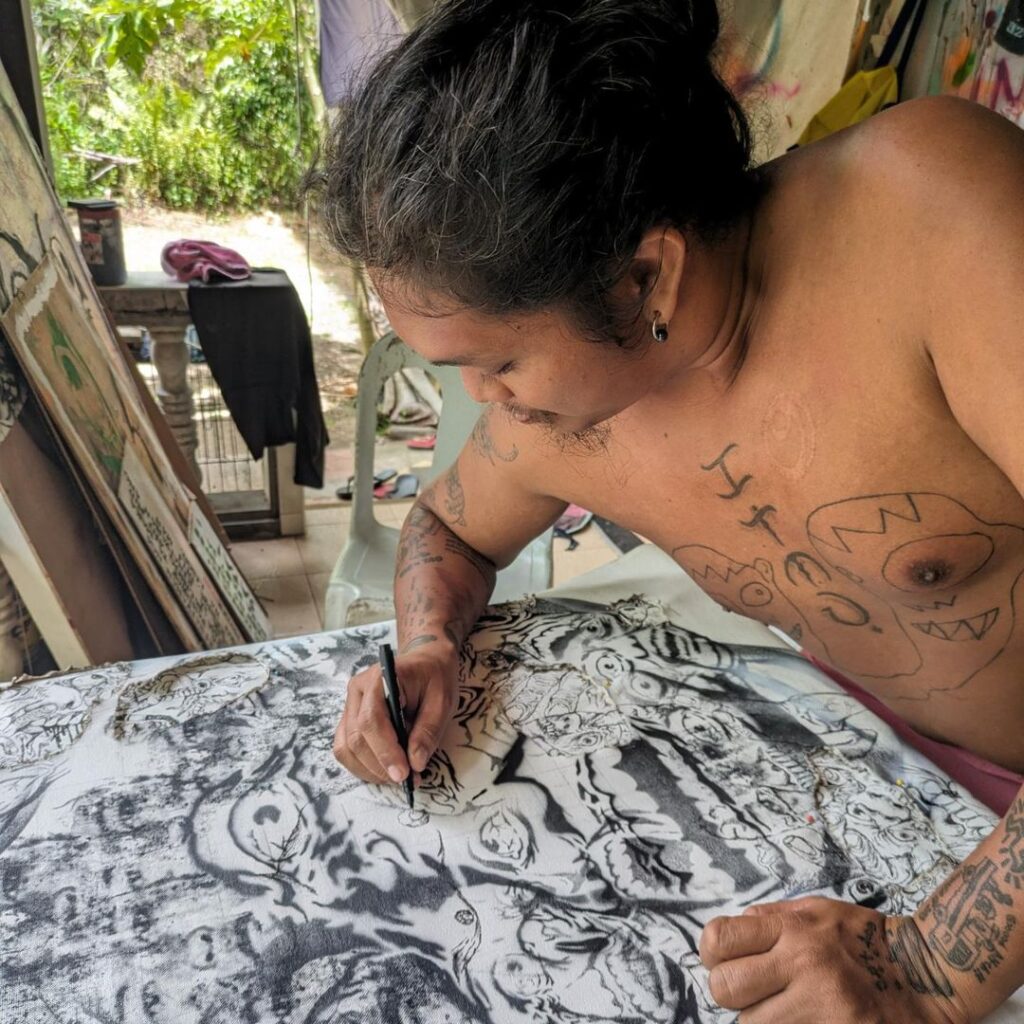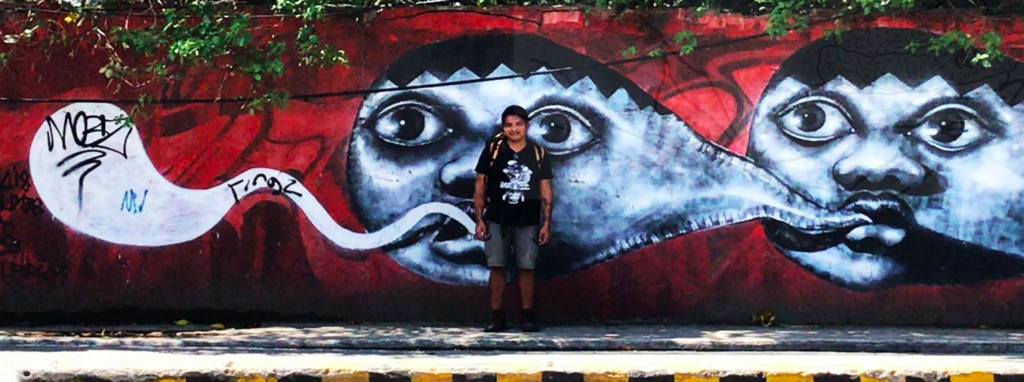For years, some might have seen this face somewhere along the bustling streets of Cebu City.
Do you remember seeing this round face with bulging eyes and geometrically shaped bangs—in some cases, visually warped dreamily on the walls of local landmark avenues?
This is merely one of the art Cebuanos often notice but somewhat disregard as they routinely pass by busy streets. For some reason, they fail to build enough interest to know the story behind this uncanny face, maybe because people are too busy living their lives.
As we celebrate World Art Day, it is about time to shine a spotlight on one of the artists who sprinkle life on each corner of the street in the city, creating a character out of what once were empty cement walls and ruins.
Today, let us meet the artist behind this infamous face we see along the streets of Cebu.
READ MORE:
FACES OF CEBU: Jane Frances Latorza, 21, digital artist
FACES OF CEBU: Vince Dherek Joaquino, 19, visual artist
Meet Soika
Meet Soika, an anonymous artist born in Leyte but raised by the local art scene in Cebu. Some may know him as one of the rising street artists of our generation, but for now, we get to know him as the artist behind the comical face.

Soika | Photo: @soikavomits / IG
Soika has possibly produced thousands of art pieces both on the streets and in his studio in his hometown. Still, he is more popularly established as an important figure in Cebu street art.
He started creating his early artworks with less tonal value and mostly flat figures. But, like his artistic pursuits, his art grew and evolved as he transitioned from splashing colors on his work to religiously using black and white as his motif, which people popularly see on the streets.
In an interview with CDN Digital, Soika claimed that amid these changes in his art, he remained true to his artistic identity to focus on “disbeautification” as a theme throughout his journey and trace as an artist.
“Ang disbeautification element which is usa sa mga (one of the many) super protagonists kay mao ang dili mawala (because this is not one that will disappear) and forever be as it is,” he claimed as he explained his chronological journey as an artist.
Exploring his art
Throughout his decade-long journey as an artist, he immediately embraced such a branding that labels his work as an art that disturbs with notable elements that other artists do not always use in their art, including feces and genital organs.
In becoming the artist that he is today, Soika went through a long journey toward finding techniques that would help elevate his art. Notably, he initially explored the element of warping, which is prevalent in most of his works on the streets of Cebu.

Two of the sample works of Soika in the streets of Cebu | Photo: Stan Cabigas
Not long ago, he slowly started unintentionally letting go of this element while introducing another flavor to his art: stenciling.

(Left) Sample of Soika’s stenciling technique in producing art and (Right) sample of his latest street art in Leyte. | Photo: @soikavomits / IG
Most of his new art pieces were made using the marriage of stenciled paper and spray paint, which Soika described as a way to “achieve less effort” and create art that he considers “more fun” as it is produced by the artist and showcased to its consumers.
READ MORE:
In Dagupan, street art offers reprieve from health crisis
Caught up in the wonders of the deep
Cebu City flyover attracts onlookers with its vibrant colors
About the Face
In most of his artworks, we notably see this face. Who is he, and what is he doing in Soika’s art?

The uncanny face plastered on street signs in different places. | Photo: @soikavomits / IG
The artist disclosed to CDN Digital that the infamous face is actually a direct representation of his younger self, which he described as a rowdy child born in a conservative space.
The round face and the triangular bangs were some of his notable features as a child, which most people around him label as “bugoy”.
By incorporating it in his art, it depicts a story of a young child with artistic pursuits born in a space that hinders him from expressing it. As he found his community in Cebu, he started to develop his artistic identity and inspiration to express himself.
This was when he established himself as an artistic figure who tells a story of how he became who he is today through the face he plasters on his art.
READ MORE: Filipino art is world-class art
Street Art in Cebu
When asked why he chose street art as a medium, Soika explained that it was where he found his freedom, where he felt like he had no boss or master to serve as he chose to express himself in his own world through the empty walls with the adrenaline that would come with the different levels of risk true to the nature of street art.
Nonetheless, Soika disclosed that he would now choose to rechannel his artistic pursuits out of the streets and into his own studio in Leyte although he still occasionally paints on street: “Sa kaniadto nga bata-bata pa [ko], lingaw kaayo ang risk, sa pagkakaron nga naa nako mas gi-focus nga other shrine of freedom in my studio, medyo chill na lang along gusto sa akong creative pursuits.”
(When I was still younger, I enjoyed taking risk, for now I am now focusing on other shrines of freedom in my studio, I am now chill in my creative pursuits.)

Soika in front of an art he painted along Archbishop Reyes Avenue in 2020. | Photo: Kurt Romariz
Still, the artist embraced the local street art scene in Cebu when he realized that it has its own unique flavor that is far from what is produced by first-world countries.
Name-dropping other Cebuano street art figures within the likes of The Bart Brothers, Kdlt, Kowlown, and Wyndelle Remonde, he claimed that each shines in their own unique techniques in producing their art.
By producing their own artistic identity through their own unique techniques, Cebuano street artists like Soika get to express their inner selves as they persevere to showcase art for the masses, splashing it in common spaces readily accessible to disturb and catch the eyes of a regular Cebuano one street wall at a time.

